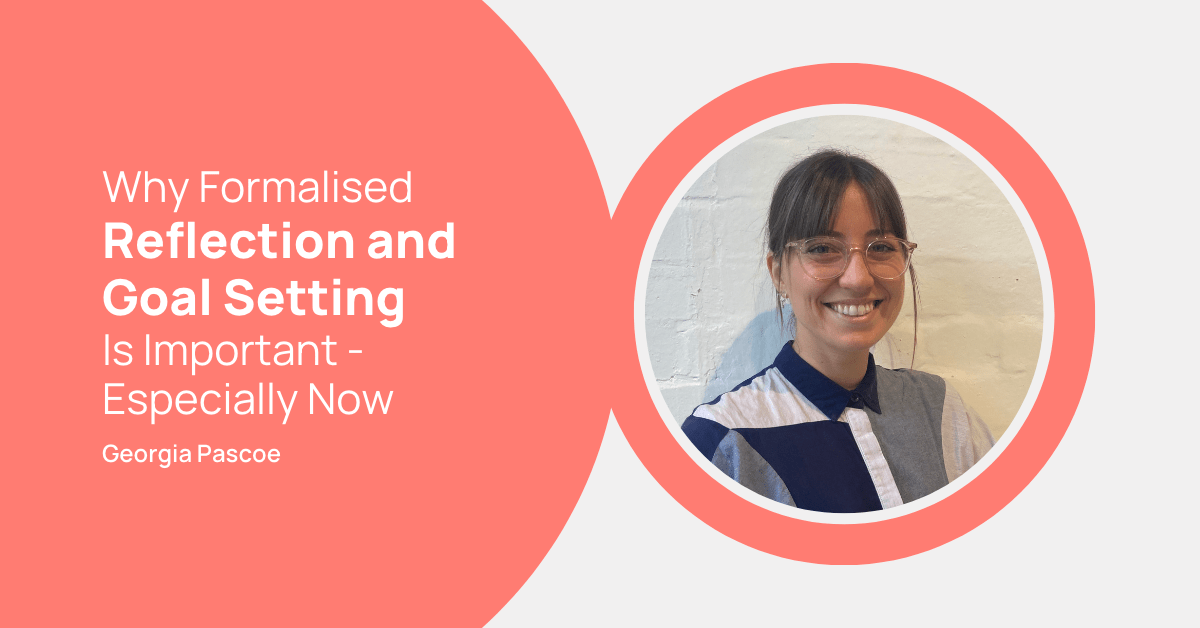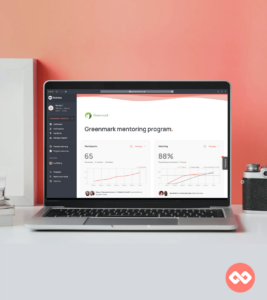Mentorloop’s Head of Customer Success, Georgia, shares her thoughts on the current work environment we all find ourselves in and how reflection and goal-setting practices have helped her not lose sight of the bigger picture.
What’s happening in my newsfeed?
It’s an interesting and sometimes scary environment right now – especially in the world of HR and HR Tech. AI is expected to revolutionise the future of work, with debate on what role tools like Chat GPT will play in the modern workforce. The world of venture capital is becoming increasingly conservative impacting many founders, and countless industries are vulnerable to more layoffs due to macroeconomic factors such as inflation.
It feels like my feed is constantly laced with job insecurity, combined with eye-watering inflation. Resulting in the frightful realisation that I can no longer afford my double shot almond milk flat white – likely described by Chat GPT as “a ridiculous coffee order deserving to be discontinued”.
How does this impact me at work, and how can reflective practises help?
In this uncertain environment, it’s common (and completely understandable) for people to become risk-averse, double down on what they can control, and make an effort to be grateful for what they’ve got – all of which serve us well. I’m increasingly recognizing these behaviours in myself, but subsequently, I also noticed my other aspirations move firmly to my periphery (alongside my fading ritual of a cafe-bought coffee).
This is why I think formalised Reflection and Goal Setting practises are incredibly important right now. I think these help us keep our sights on the bigger picture and what’s important to us, whilst in (varying levels of) survival mode.
If you want to deep-dive into the who, when, why, what, and how of Goal Setting or reflective practises, you can do so on our blog. But for this piece, I want to share a quick win exercise that I’ve found invaluable in my journey to help me reflect and apply those insights to my goals.
An Exercise You Can Try: Evaluating Your Top 3 Strengths
You can work through your results in your next mentoring session — and yes, I adamantly believe this is an equally valuable exercise for both mentors and mentees.
Step 1: Ask yourself, “What are my top 3 strengths?” and write them down
Mine are:
- Adaptability
- Relationship building
- Being a unifier
Step 2: Ask 10 people in your life the same question and document their answers
I suggest a balance of family, friends, managers, and peer colleagues.
My results were similar to my own evaluation, amongst some other emerging themes such as being a resolver / problem-solver.
Step 3: How are you using your strengths in the following (relevant) domains:
Work, Family, Friends, Partner, Children, Hobbies, Education
Here are some of my examples:
Adaptability: As part of a small team at work, being adaptable helps me wear many hats and navigate uncertainty more easily.
Relationship building: Developing deep relationships is the most important thing in my life. This is present in all domains, helping me be a unifier at work, as well as with my family and friends.
Resolver: Problem-solving is incredibly important in my work and it’s important to remind myself I’m actually good at it. Additionally, this strength has allowed my woodworking hobby to flourish too. I get so much satisfaction learning new techniques or trying different things to help my projects come together.
Step 4: How can these attributes help you achieve your goals, or create new goals?
Taking time to reflect on this has helped me revisit and prioritise some of my goals – one of which is to build some bedside tables!
Why? Upon reflection, I feel that my woodworking hobby helps me flex my problem-solving muscles – something that has helped me think more laterally in my job. I also find that it provides me with positive momentum so I want to intentionally find more time to pursue this hobby.
Some takeaways from this exercise over the years
1. Realise the value of your own qualities you take for granted
Every single person I asked, in one way or another, included my ability to empathise, connect and create space for others.
For a long time, I didn’t appreciate this as an asset – ‘That’s not a skill!’, I’d rebut. Because it comes naturally to me, I thought it was a given. I learned that when something comes naturally to you, it can be easy to discredit or overlook as a commercial skill or asset.
This exercise helps me recognize and appreciate my strengths, allowing me to be confident in situations where I need to lean on them.
2. Affirm what you’re unsure of or what you couldn’t see
It allows you to confirm things you suspect you’re good at but aren’t sure of or identify your blind spots.
Something I have to be conscious of as a leader is balancing acceptance and high tolerance (for the different ways people work – which is often great) with being authoritative when it’s needed.
Obviously, this exercise doesn’t fix this issue for me but being self-aware about where you might have shortcomings is the first step to addressing them so it definitely helps me in this regard.
3. Reflect on what you show at work versus your personal life
Collecting feedback from people in all areas of your life affords you the ability to see habits or personas you may have subconsciously developed. I’m personally fortunate that I have always felt comfortable being myself at work, so there’s not a lot of disparity — which isn’t the case for many, especially those in minority groups.
However, there was a time when I was struggling with deep self-doubt at work, which manifested in not backing myself or being a confident leader. The reality was that shying away from opportunities to exercise leadership or to unify teams (an area I bring value), was further detrimental to my overall confidence and success.
Final bits of advice
I’m obviously a huge fan of this exercise but there are a few small challenges to watch out for. So here are a few pieces of advice for anyone who wants to do it too.
First, it may seem awkward to ask others about your strengths at first, but that’s okay! Ask anyway. A good trick is to start with the people you’re most comfortable with and get used to hearing their feedback first. The more you do it, the easier it gets.
Second, don’t get caught up in the specific words that people use. Instead, try to find common themes and underlying traits. For example, a coworker may call you a great facilitator in team settings while a friend may call you a unifying person in your friendship group. Those have the same underlying theme of being someone who knows how to bring people together and create a great environment for people to work and thrive.
Lastly, as I mentioned earlier, this exercise isn’t meant to solve any issues or problems for you. What it does do is help you become more self-aware, which as we know is the first step to making improvements or nurturing your strengths. And if you’re doing this for your mentoring sessions, I suggest doing this early on as it can help inform your next action steps.
I hope you find this useful! Good luck!




